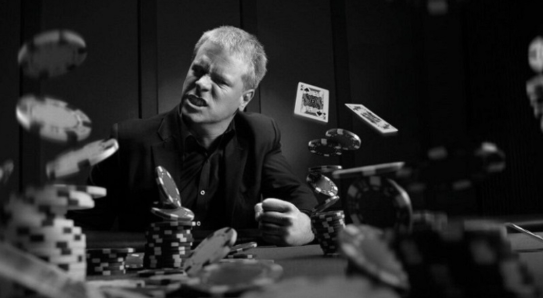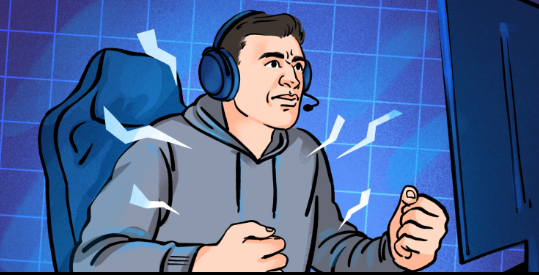
Bad Beats
Coolers
Jokes at the Table
General Atmosphere in the Room
Your Own Mistakes
Playing When Tired

These and other factors can trigger negative emotions that can and will affect your play if you don’t control them.
Depending on your personality type, you may get irritated more easily than some other players.
While this isn’t a good trait if you want to make money in poker, it’s also not the end of the world if you understand the problem and approach it correctly.
Consciously decide not to let your emotions control you!
While some tilt triggers vary from person to person, most players are prone to tilt after a nasty bad beat or a series of coolers.
In fact, a prolonged period of losing can derail many players from their top-notch play, even if they have good technical knowledge.
As I’ve already explained, it’s just human.
Only human beings can tilt in poker. You just need to learn to recognize when you’re tilting and then regain your composure.
In a situation where you did nothing wrong and still lost simply because another player got incredibly lucky, it’s normal to feel upset.
But you need to learn to recognize it and consciously not let your emotions control you. Focus on your decisions, not the results.
The fact is, bad beats will happen again and again as long as you play poker. That’s how variance works.
You can’t afford to focus on the results of past hands as if they somehow predict what will happen in the future.
If you’ve been dealt pocket aces three times in a row, you shouldn’t play them any differently the next time you get them (assuming you didn’t make any mistakes the previous three times).
Of course, this is easier said than done. Once that feeling starts creeping in that no matter what you do, you’ll lose, it’s tough.
The hardest part is recognizing and admitting that you’re on tilt.
If things aren’t going your way and variance is hitting you in the face, you should be especially careful and take your time making decisions.
Once you find yourself losing, you may start throwing good money after bad, playing hands you’ve never played before, either chasing your losses or adopting a «it doesn’t matter what I do» mentality.
As soon as you notice this happening, it’s time to take action.
Most people have a hard time regaining their composure at the table, so take a short break. Take a short walk, grab a snack, meditate for five minutes, or do anything that helps you calm down.
And if you come back and still can’t play without emotion, stop, if it’s a cash game. It’s much better if you come back fresh another time.
Don’t be too hard on yourself
Let’s get one thing straight: you will never be able to play perfect poker. No one plays poker perfectly, and everyone makes mistakes.
You will make mistakes, and they will cost you money.
However, dwelling on these mistakes during play can be very dangerous and lead to a completely different type of tilt.

If you make a mistake that causes you to lose a significant pot, that’s it. That opportunity is gone, that pot is lost, and the best thing you can do is focus on the next hand and try to play it as best you can.
However, it’s not uncommon for you to get stuck on one mistake, and all your future actions are somehow dictated by it.
I’ve already screwed up, so what difference does it make?
But it does matter, of course.
You’ve lost one hand, but there are many, many more to come.
As long as you have chips in front of you, you have a chance to turn things around. Even if you’re entering a tournament with five big blinds, make the best decisions possible with those small chips.
I’ve recovered many times and even won tournaments after just a couple of big blinds, and that’s not as rare as you probably think. I
If you focus solely on making the best possible decisions, you’ll surprise yourself with the results.
One tip is to write down every hand you feel you played poorly, take screenshots, or mentally save it for later review. This way, you’re not actually «forgiving» yourself, but you’re also not letting it affect your play.
Once you get home and are ready, you can review any questionable hands and see what you could have done differently.
Once you adopt this strategy, it will be much easier to discard poorly played hands and avoid compounding your losses by making even more bad decisions just because of one that got away.
Physical Fitness is Key to Tilt Management
Poker may not seem particularly physically demanding, but you can’t separate your mental and physical fitness.
When it comes to tilt, it’s crucial to play rested, well-fed, and put other issues aside during your sessions.
You’ll be much more susceptible to tilt if you play when you’re tired or have a million things on your mind.
Take care of yourself
Taking care of yourself is perhaps one of the simplest, yet most important, things you need to do to become a successful poker player and overcome tilt in poker.
It’s much easier to deal with bad beats when you’re playing a session after a good night’s sleep than trying to get through it on just a few hours’ sleep.
I’ve tried the latter approach many times in my poker career and can confirm there’s a huge difference between the two.
The same can be said about food. If you’re hungry, you’ll be much more likely to get irritated even by things that wouldn’t normally bother you. So, preventing tilt starts long before you even sit down to play.
I’m not going to try to give you a precise plan for what you should eat to improve your performance, but maintaining a balanced diet and avoiding excessively salty and sweet foods can help.
There are many excellent guides that can help with this.
It’s also worth mentioning that you absolutely need to eat before you start playing, especially if you’re planning a long session. Either that, or schedule dinner at some point and try not to skip it.
Leave your problems at the door and immerse yourself fully in the game, the battle, the fight. Any problems or issues you encounter should be put aside until you’re done playing.
You won’t be able to deal with them at the table, and they’ll still be there when you’re done, so focus on playing the best poker you can.
I know it’s easier said than done, but if you want to play seriously, you need to learn how to do this.
I’ll just say this: One thing that helped me the most was devoting some time to preparation before each session, when you sit down to play. It can be as little as 5-10 minutes of reviewing some hands, reading strategy articles, or discussing poker theory with a friend to get your mind warmed up and into the poker game. This has really helped me forget about other problems, and hopefully it can do the same for you. Plus, once you get used to warming up, you’ll be able to recognize your emotions and notice when you shouldn’t be playing at all.
